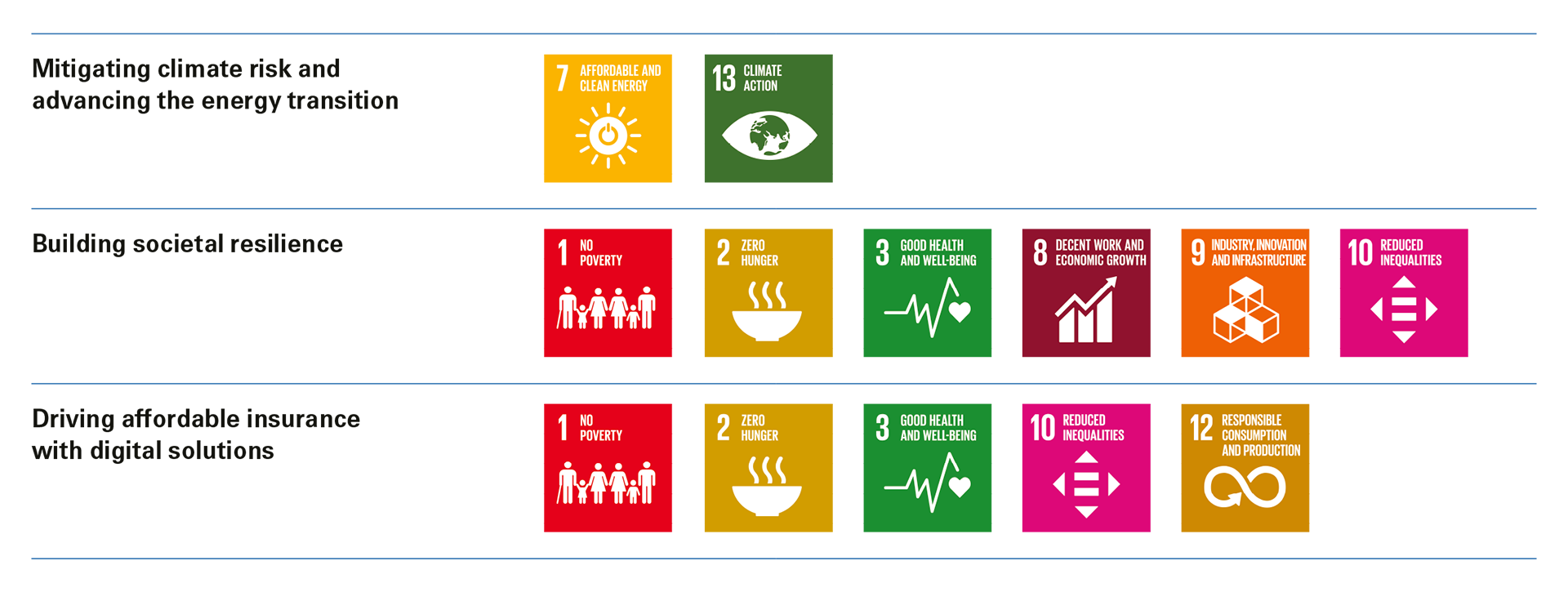- Home
- Sustainability
- Our approach
- How we determine materiality
- UN Sustainable Development Goals
Our approach to the UN Sustainable Development Goals
We fully endorse the UN Agenda 2030 and regard the UN Sustainable Development Goals (SDGs) as an important reference point to determine our material Sustainability Topics and how to address them. Since the SDGs were launched in 2015, we have continuously refined our approach to the SDGs and seek to understand how our business contributes to achieving the goals.
We started by mapping the SDGs to our 2030 Sustainability Ambitions and our Sustainability Topics, clearly showing where we contribute to them (see “Sustainability Topics: goals and progress“).
We then explored how to use our Group Sustainability Strategy to further align our activities with the SDGs and understand related strengths, opportunities and risks.
Since 2019, we have been working with our business portfolio owners to assess our individual reinsurance underwriting portfolios using the SDGs as a sustainability lens, to better understand their contributions to the SDGs and identify areas where we can increase our positive impact. The SDGs allow us to better understand nuances within the broad and complex topic of sustainability. Through an annual process, we look at each of the 17 goals and identify where our business has the biggest impact in terms of contributions as well as potential harm, estimate their materiality and define concrete measures. This is how we are building sustainability into portfolio management on the liability side of our business.
For our clients, we have sustainability-focused training where the SDGs feature in several modules. In 2021, we conducted three such training programmes, with each one running in modules over the course of several weeks (see Swiss Re Sustainability Client Programme on page 51 for further details). Furthermore, we created an inventory of re/insurance products with particularly strong contributions to the SDGs, making these links visible to our client managers and management.
To better understand the re/insurance industry’s contribution to the SDGs, we work with the UNEP FI Principles for Sustainable Insurance to develop Insurance SDGs (iSDGs) for the liability side of our business. The iSDG initiative is an industry-led research and development effort to develop re/insurance-relevant SDG indicators and a quantification methodology to track progress towards the global goals.
As we have started measuring the carbon footprint of our direct insurance business, we have embarked on a similar journey to go beyond carbon and start exploring how to quantify our sustainability footprint across several dimensions.
On the asset side, we identify and analyse the contribution of our investments to the SDGs under the Inclusion cornerstone of our Responsible Investing strategy, and we measure the real-world impact against pre-defined and standardised KPIs, applying the SDI Asset Owner Platform’s “Sustainable Development Investments (SDIs) Taxonomy & Guidance”¹ and the “SDG Impact Indicators Guide for Investors and Companies”² developed by the SDG Impact Assessment Working Group.
The overview below presents the most relevant SDGs for the three ambitions of our Group Sustainability Strategy. In addition, you can learn more about which SDGs we address through our activities in the (see “Sustainability Topics: goals and progress“)

- https://www.sdi-aop.org/files/sdi-taxonomies-and-guidance-june2020.pdf
- sdg-impact-measurement-final-draft_tcm46-363128.pdf (dnb.nl)
Our Group Sustainability Strategy and related SDGs
